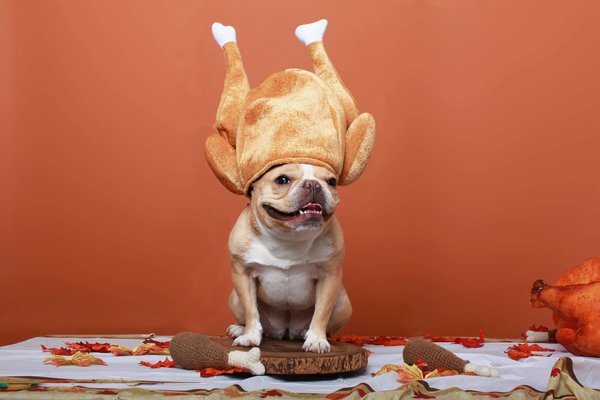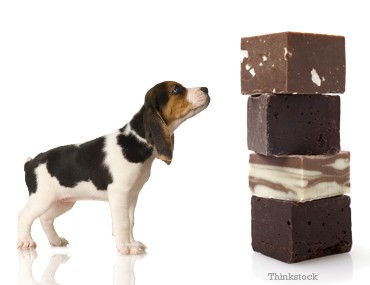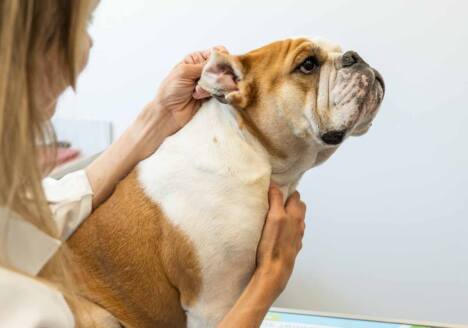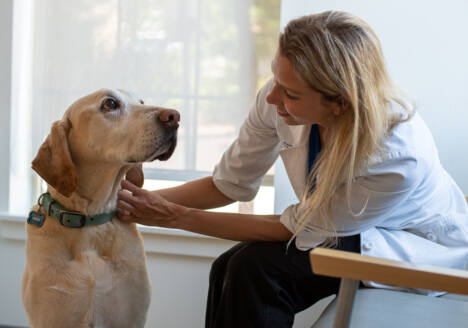This time of year, many of us are busy in the kitchen, preparing a special Thanksgiving dinner for our family. Our pets feel like family too, and often pet owners are tempted to bend the rules and share some of the festive human food with their furry companions — don’t do it! Unfortunately, each year our hospital receives severely ill pets who indulged in the human holiday food.

To help keep our pet community safe, we’ve put together a list of the top five things to avoid sharing with your pets this Thanksgiving:
-
Turkey (and its trimmings):
- The Problem: While a small, plain, boneless piece of cooked white meat turkey might be okay in moderation, the problem is that Thanksgiving turkey rarely comes plain. It’s often roasted with seasonings (onions, garlic, herbs, etc., many of which are toxic), basted in fats, and covered in gravy. Dark meat and skin are very high in fat.
- The Consequences:
- Pancreatitis: The high fat content can trigger pancreatitis, a serious inflammation of the pancreas. Pancreatitis causes severe abdominal pain, vomiting, diarrhea, loss of appetite, and can even be fatal.
- Gastrointestinal upset: Even without pancreatitis, rich, fatty foods can cause vomiting and diarrhea.
- Toxic seasonings: Onions and garlic are toxic to dogs and cats, damaging red blood cells and potentially causing anemia. Many herbs and spices can also cause digestive upset.
-
Turkey Bones:
- The Problem: Cooked turkey bones are brittle and can splinter easily.
- The Consequences:
- Choking: Small splinters can lodge in the throat, causing choking.
- Internal injuries: Sharp bone fragments can puncture the esophagus, stomach, or intestines, leading to serious infections and internal bleeding. This can require emergency surgery.
- Obstruction: Larger bone pieces can cause blockages in the digestive tract, preventing food from passing through. This also usually requires surgery.
-
Salads with Grapes/Raisins:
- The Problem: Grapes and raisins are highly toxic to dogs. The exact mechanism is unknown, but they can cause acute kidney failure. Even a small amount can be dangerous.
- The Consequences:
- Kidney failure: Symptoms can include vomiting, diarrhea, lethargy, loss of appetite, and increased or decreased urination. Kidney failure can be fatal.
- Other symptoms: Grapes and raisins can also cause vomiting, diarrhea, and abdominal pain.
-
Mashed Potatoes:
- The Problem: Plain, boiled potatoes are generally safe for dogs in small amounts. However, mashed potatoes are typically loaded with butter, milk or cream, salt, and often onions and garlic.
- The Consequences:
- Pancreatitis: The high fat content from butter and cream can trigger pancreatitis.
- Gastrointestinal upset: Dairy products can cause digestive upset in lactose-intolerant dogs.
- Toxicity: Onions and garlic are toxic, as mentioned above.
- Weight gain: Mashed potatoes are high in carbohydrates and calories, which can contribute to weight gain over time.
-
Bread Dough:
- The Problem: Raw bread dough contains yeast.
- The Consequences:
- Bloat: The yeast causes the dough to rise in the stomach, expanding and potentially causing gastric dilatation-volvulus (GDV), also known as bloat. Bloat is a life-threatening condition where the stomach twists, cutting off blood supply and causing shock.
- Alcohol toxicity: As the yeast ferments, it produces alcohol (ethanol). This can lead to alcohol poisoning, causing neurological problems, weakness, incoordination, and even death.
Important Note: This list isn’t exhaustive. Many other Thanksgiving foods can be harmful to pets. It’s best to stick to your pet’s regular diet and avoid giving them any table scraps, especially during the holidays. If you want to give your pet a special treat, consider offering them pet-specific treats or a small amount of plain, cooked chicken or turkey (white meat only, no skin or bones). And, as always, if you suspect your pet has ingested something toxic, contact your veterinarian immediately.


